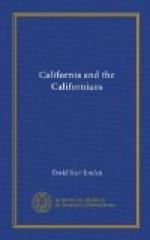Of elbow room California offers abundance. In an old civilization men grow like trees in a close-set forest. Individual growth and symmetry give way to the necessity of crowding. Every man spends some large part of his strength in being not himself, but what some dozens of other people expect him to be. There is no room for spreading branches, and the characteristic qualities and fruitage develop only at the top. On the frontier men grow as the California white oak, which, in the open field, sends its branches far and wide.
With plenty of elbow-room the Californian works out his own inborn character. If he is greedy, malicious, intemperate, by nature, his bad qualities rise to the second degree in California, and sometimes to the third. The whole responsibility rests on himself. Society has no part of it, and he does not pretend to be what he is not, out of deference to society. “Hypocrisy is the homage vice pays to virtue,” but in California no such homage is demanded or accepted. In like manner, the virtues become intensified in freedom. Nowhere in the world can one find men and women more hospitable, more refined, more charming than in the homes of prosperous California. And these homes, whether in the pine forests of the Sierras, in the orange groves of the south, in the peach orchards of the Coast range, or on the great stock ranches, are the delight of all visitors who enter their open doors. To be sure, the bewildering hospitality of the great financiers and greater gamblers of the sixties and seventies is a thing of the past. We shall never again see such prodigal entertainment as that which Ralston, bankrupt, cynical, and magnificent, once dispensed in Belmont Cañon. Nor do we find, nowadays, such lavish outgiving of fruit and wine, or such rushing of tally-hos, as once preceded the auction sale of town lots in paper cities. These gorgeous “spreads” were not hospitality, and disappeared when the traveler had learned his lesson. Their avowed purpose was “the sale of worthless land to old duffers from the East.” But real hospitality is characteristic of all parts of California where men and women have an income beyond the needs of the day.
To a very unusual degree the Californian forms his own opinions on matters of politics, religion, and human life, and these views he expresses without reserve. His own head he “carries under his own hat,” and whether this be silk or a sombrero is a matter of his own choosing. The dictates of church and party have no binding force on him. The Californian does not confine his views to abstractions. He has his own opinions of individual men and women. If need be, he will analyze the character, motives and actions of his neighbor in a way which will horrify the traveler who has grown up in the shadow of the libel law. The Californian is peculiarly sensitive as to his own personal freedom of action. Toward public rights or duties, he is correspondingly indifferent.




